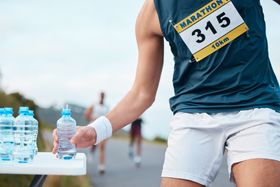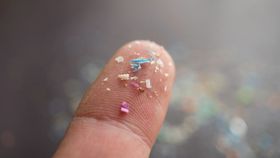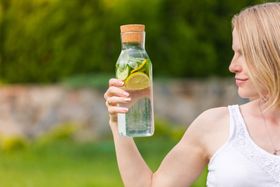How Staying Hydrated Can Ease Chemotherapy Side Effects
Chemotherapy side effects can leave you fatigues. Our guide will equip you with simple, effective hydration strategies to maintain strength and endure treatment with confidence.
Updated June 27, 2024

Chemotherapy. The harsh treatment takes a heavy toll on the body and mind. For patients undergoing it, the focus is on enduring and getting well. But, a seemingly simple element of recovery can become a significant hurdle—hydration.
Many of the unpleasant side effects, like nausea and diarrhea, make drinking fluids not only tricky but downright unappealing. This is where finding easy and tolerable solutions becomes vital.
By prioritizing convenient hydration methods, patients can free up mental and physical energy to focus on what truly matters—healing and returning to their lives.
» Try electrolyte drops to improve your hydration and replace lost liquids
How Does Chemotherapy Affect Hydration?
While chemotherapy itself doesn't directly cause dehydration, it can lead to it in a couple of ways:
- Nausea and vomiting: A common side effect of treatment affecting 70–80% of patients is chemo-induced nausea and vomiting (CINV). It can lead to significant fluid and electrolyte loss, causing dehydration.
- Diarrhea: Chemotherapy-induced diarrhea (CID) disrupts the gastrointestinal tract and can affect 50–80% of patients, depending on the regimen used. It can also cause dehydration if not addressed.
- Renal Function: Certain agents used in the procedure, such as cisplatin, can cause nephrotoxicity. They impair kidney function and disrupt fluid regulation.
- Mucositis: Chemotherapy can damage the mucosal lining of the gastrointestinal tract, leading to mucositis. The injury makes it painful to eat or drink, contributing to inadequate water intake.
- Increased Metabolic Rate: Treatment can increase your body's metabolic rate, increasing fluid loss through sweating.
- Electrolyte Imbalance: Chemo treatment can deplete electrolytes and cause imbalances, such as low potassium or sodium levels. This can make it difficult for your body to retain fluids.
- Reduced Immunity: Cancer treatment weakens the immune system, making the body more susceptible to infections. Fever and other symptoms of infection can lead to dehydration.
» Discover how water can strengthen and protect the immune system
How to Stay Hydrated During Chemotherapy
Staying well-hydrated is crucial throughout chemotherapy to minimize side effects and improve treatment outcomes. Here are some tips to achieve adequate hydration.
1. Water and Juices
Aim for small fluids throughout the day, targeting the intake we mentioned. If you want to remind yourself, you can set up smartphone alarms or hydration-tracking apps to ensure you stay on track. Water should be a priority, but herbal teas, diluted fruit juices, and clear broths can also help.
» Discover how your food and water choices can impact your health
2. Intravenous Fluids
Intravenous (IV) hydration rapidly hydrates and replaces fluids lost through chemotherapy side effects like nausea and diarrhea. It also helps correct electrolyte imbalances caused by chemotherapy, like hyponatremia or hypokalemia.
Ensuring adequate hydration helps prevent complications, supports kidney function, and promotes overall well-being.
» Want an energy boost without the dehydrating effects of caffeine? Check out these caffeine-free alternatives
3. Ice chips
Chemotherapy can be rough, and keeping yourself hydrated is important to feel better. Ice chips can be a real help, especially if nausea or mouth sores make drinking tough.
They're nice and soothing and slowly melt to moisten your mouth. Plus, they're easy to swallow and won't mess with your diet. But they alone won't keep you hydrated for long because you don't get as many fluids, and they can't replace the electrolytes you might lose.
4. Hydrating Food
Since food is an important part of hydration, make sure to eat plenty of fruits and vegetables like cucumbers, watermelon, strawberries, and oranges. Soups, broths, smoothies, and shakes made with fruits, vegetables, yogurt, and water or milk are great options, especially if you struggle with solid foods.
Symptoms of Dehydration
Be aware of the following symptoms of dehydration that may occur during chemotherapy, such as:
- Dry mouth, tongue, or lips
- Dizziness
- Feeling weak or tired
- Nausea
- Constipation
- Dry skin
- Swollen, dry, cracked tongue
- Fast weight loss
- Headache
- Dark yellow urine or less urine
- Irritability
- Fatigue or exhaustion
Note: If you experience any of these signs of dehydration, please contact your doctor immediately.
Although your doctor will monitor your hydration during treatment, there are ways to track it at home.
- Urine Output: Aim to urinate every few hours during the day. The color should be pale yellow to clear. Darker tones indicate dehydration.
- Skin Pinch Test: Gently pinch the skin on the back of your hand and hold for a second. When you let go, it should quickly snap back into place. If it takes a few seconds to return to normal, it could be a sign of dehydration.
» Understand how dehydration can impact your cardiovascular health
How Much Water Should You Drink?
There's no single answer to how much water chemotherapy patients need daily to stay hydrated because individual needs vary.
While daily intake recommendations suggest around 11.5 cups for women and 15.5 cups for men, this includes fluids from both meals and drinks. Since food contributes about 20% of your daily water needs, women actually need about 9 cups of beverages, and men need roughly 13 cups.
Hydration and Its Role in Chemo Treatment
Although chemotherapy can lead to dehydration through various mechanisms, staying hydrated can benefit the treatment process in several ways.
Reduced Toxicity
Adequate fluid intake helps dilute chemotherapeutic drugs in the bloodstream. This reduces their concentration and minimizes damage to healthy tissues like kidneys and liver. Studies suggest this can lead to better treatment response and potentially improved survival rates.
» Find the best water to ensure optimal kidney health
Improved Gastrointestinal Health
Drinking enough fluids helps maintain the integrity of your gastrointestinal tract, promoting better nutrient absorption and overall digestive comfort. This can be crucial during chemotherapy, when nausea, vomiting, and diarrhea are common side effects.
Better Fatigue Management
Dehydration can worsen fatigue, a common side effect of chemotherapy. Drinking fluids helps optimize cognitive function and can improve energy levels. Patients can then participate more actively in daily activities and maintain a more positive outlook throughout treatment.
Note: While hydration is essential, please consult your healthcare professional to find out the best fluids needed during chemotherapy.
» Learn more about how electrolytes fight fatigue and boost your energy levels
Choosing the Right Water Source
Filtered water
Filtered water is a reliable and readily available option. Devices can remove contaminants like chlorine, lead, and other heavy metals, as well as bacteria and parasites. This can be particularly beneficial for those with compromised immune systems.
Note: Tap water quality can vary. In some areas, it might contain contaminants harmful to patients with weakened immune systems. Check local water reports and consult your doctor if you have any concerns.
» Learn more about the health benefits of filtered water
Alkaline Water
Alkaline water has a higher pH level than tap. While the theory that it neutralizes acidity in the body—which can contribute to reflux—lacks solid scientific evidence, some patients find it helps manage chemotherapy-induced acid reflux.
» Find out how to naturally increase the pH of water at home
Spring Water
Naturally sourced from underground springs, this water often contains beneficial minerals like calcium and magnesium. These minerals can help replenish electrolytes lost through side effects like vomiting and diarrhea. The natural taste also encourages better overall hydration.
Electrolyte Drinks
Specially formulated with added electrolytes like sodium, potassium, and magnesium, these drinks are ideal for replenishing electrolytes lost through vomiting, diarrhea, or excessive sweating.
Many electrolyte drinks contain sugar, which can worsen dehydration and other chemotherapy side effects. Electrolyte drops added to water offer a way to replenish electrolytes without the drawbacks of sugary beverages.
» Discover the best ways to add electrolytes to drinking water for enhanced hydration
A Solution for Hydration and Replenishment
Chemotherapy is grueling—physically and mentally. While proper hydration is crucial for everyone, it is an absolute necessity for cancer patients undergoing treatment. It's not just about feeling better—it can improve how well the body tolerates chemotherapy and the effectiveness of the treatment.
Unfortunately, maintaining hydration can be a struggle for chemo patients. Nausea, diarrhea, and taste changes can challenge adequate hydration. Electrolyte drops are a valuable solution here.
They can enhance hydration and replenish electrolytes. Additionally, their virtually tasteless nature makes them a discreet and versatile option. Patients can easily add them to various beverages, making it easier to maintain fluid balance even when nauseated.
» Experience sugar-free hydration with electrolyte drops














































